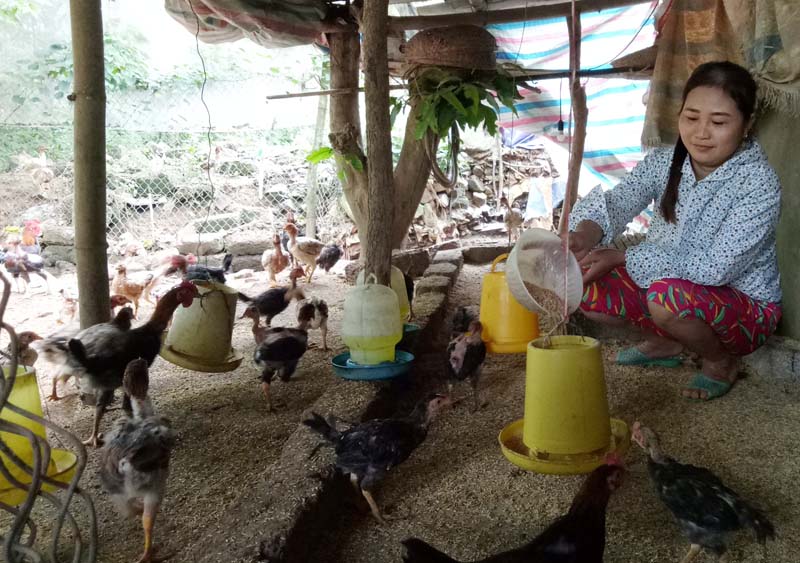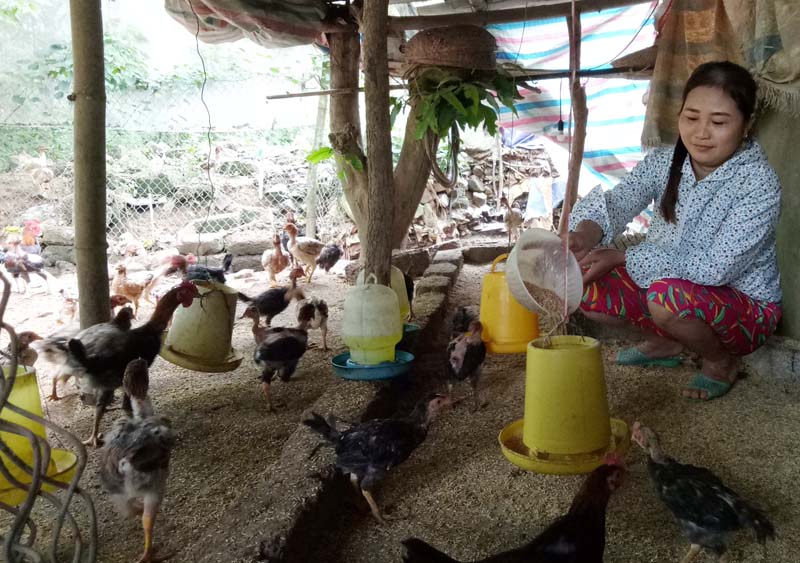
(HBO) – The Vietnam Bank of Social Policies (VBSP)’s branch in Ky Son district has effectively implemented preferential credit programmes over the years. This is considered an effective tool in creating jobs and ensuring social welfare for ethnic people in the locality. People’s livelihoods have much improved thanks to preferential credits for economic development.

Family
of Nguyen Thi Hai in Van Tien village, Dan Ha commune (Ky Son district) invests
in poultry farming to bolster household economy.
Since 2017, the policy credit programmes
contributed to the building of 641 new clean water and sanitation works in
rural areas, helping to improve local people’s lives. They also provided loans
for 11 disadvantaged students and created jobs for 111 labourers.
As many as 23 poor and disadvantaged
families received loans to repair and upgrade their houses, thus stabilising
their lives.
As many as 152 households that have escaped
from poverty and near-poverty statuses, remain beneficiaries to preferential
credits toward sustainable poverty reduction.
Nguyen Manh Hung, Director of VBSP
transaction office in Ky Son district, said that the office has carried out 13
social policy credit programmes. As of the end of September, total loans for
nearly 4,980 families exceeded 129 billion VND (5.52 million USD). Overdue loans
in the district amounted to 287 million VND, or 0.22 percent of the total.
With the current mechanism, most of the
programmes are entrusted to socio-political organisations, with loans
accounting for 99.7 percent of the district’s total.
The trusted organisations have devised
programmes and inspected the implementation in affiliates, money-savings-and-borrowing
groups and borrowers. The VBSP’s district branch and trusted organisations
seriously attended periodical meetings, exchanged information and effectively
collaborated in steering and guiding activities of groups handling loans at
commune-level, to further improve model of money-savings-and-borrowing groups.
At transaction points in the communes, there
are signboards which record date of transaction, regulations, information on new
credit programmes, lists of households with loans within maturity date as well
as due and overdue loans.
According to data from the Hoa Binh Provincial Party Committee, the industrial production index for the first six months of 2025 is estimated to have increased by 20% compared to the same period last year. This marks the highest year-on-year growth rate for this period since 2020.
In the first six months of 2025, Hoa Binh province’s export turnover was estimated at 1.145 billion USD, marking an 18.11% increase compared to the same period in 2024. Import turnover was estimated at $ 804 million, a 17.15% increase, which helped the province maintain a positive trade balance.
The lives of the ethnic minority farmers in Tan Lac district have gradually improved thanks to the new directions in agricultural production. This is a testament to the collective strength fostered through the professional associations and groups implemented by various levels of the district’s Farmers’ Union.
With the motto the "product quality comes first,” after nearly one year of establishment and operation, Muong village’s Clean Food Agricultural and Commercial Cooperative, located in Cau Hamlet, Hung Son Commune (Kim Boi district), has launched reputable, high-quality agricultural products to the market that are well-received by consumers. The products such as Muong village’s pork sausage, salt-cured chicken, and salt-cured pork hocks have gradually carved out a place in the market and they are on the path to obtaining the OCOP certification.
In the past, the phrase "bumper harvest, rock-bottom prices" was a familiar refrain for Vietnamese farmers engaged in fragmented, small-scale agriculture. But today, a new spirit is emerging across rural areas of Hoa Binh province - one of collaboration, organisation, and collective economic models that provide a stable foundation for production.
Maintaining growing area codes and packing facility codes in accordance with regulations is a mandatory requirement for agricultural products to be eligible for export. Recently, the Department of Agriculture and Environment of Hoa Binh province has intensified technical supervision of designated farming areas and packing facilities to safeguard the "green passport" that enables its products to access international markets.



